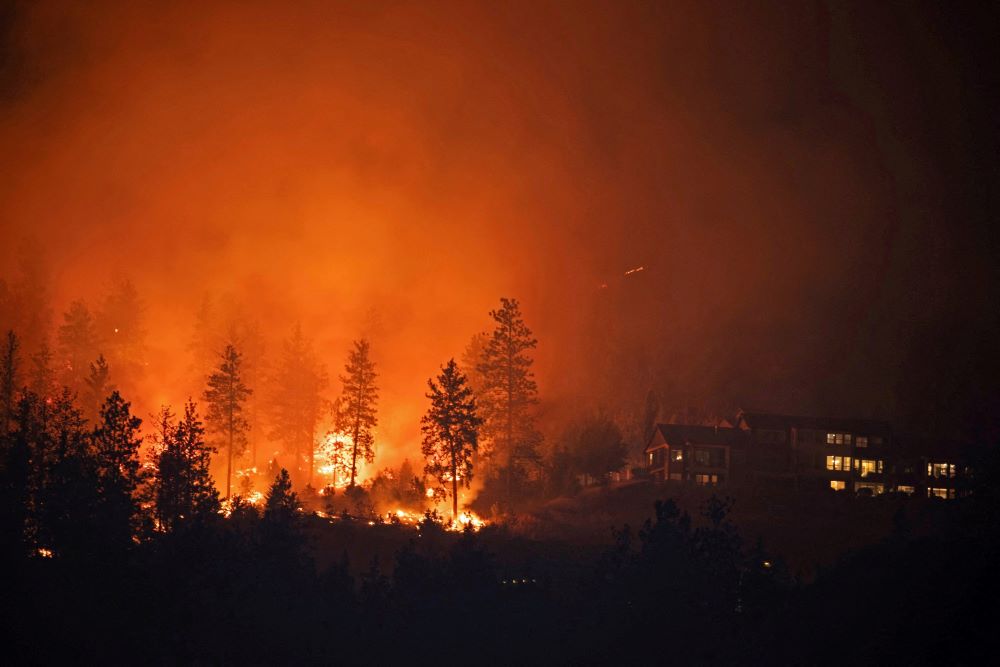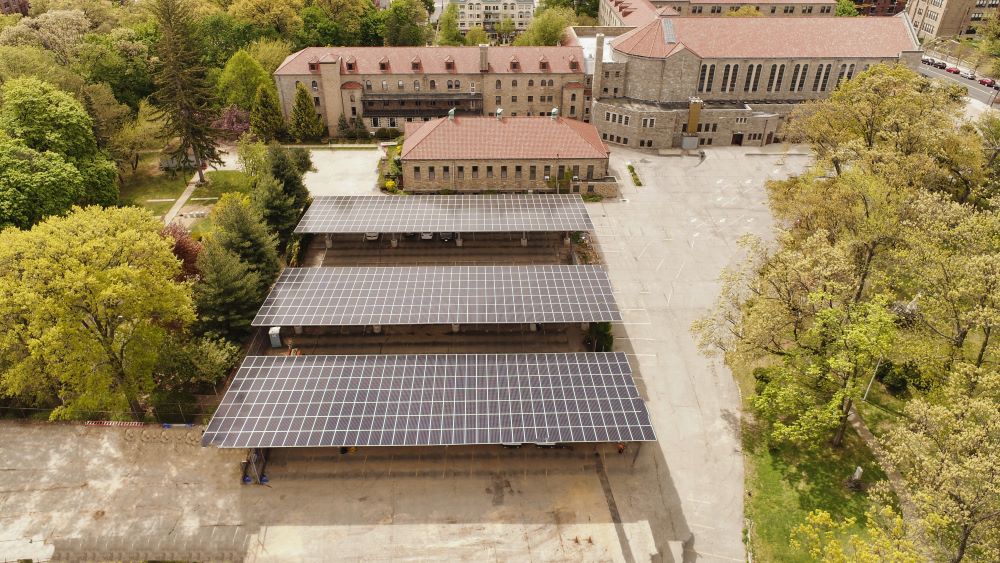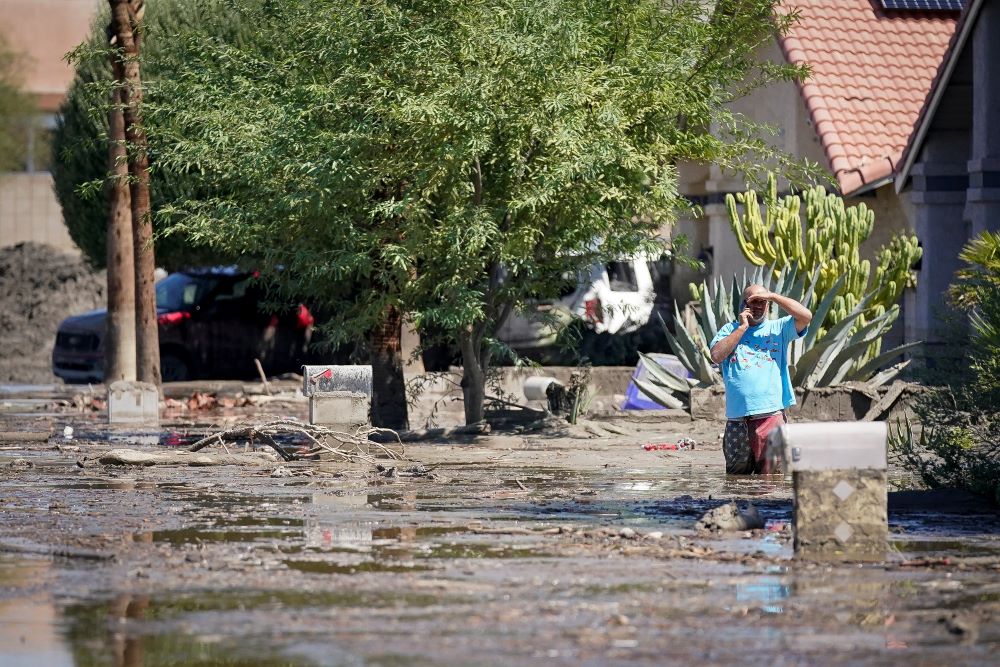
The McDougall Creek wildfire burns near homes outside the Okanagan community of West Kelowna, British Columbia, Aug. 18, 2023. (OSV News/Reuters/Chris Helgren)
Catholic social teaching is proverbially considered the church's "best kept secret." Why is that? And what can be done about it? These are among the questions that will be addressed in the next couple of days at an ecclesial gathering focused on rebooting Laudato Si', Pope Francis' landmark 2015 encyclical on climate change.
One of the reasons for the secret is that Catholic social teaching is too often taught as if it dropped from the sky with the publication of Pope Leo XIII's seminal encyclical Rerum Novarum in 1891. That text was deeply rooted in the natural law doctrines of the church and, in the manner of late 19th-century textual scholarship, in the sacred scriptures too. Key concepts like the universal destination of goods or the social mortgage on private property are not baptized versions of Marxism. They are rooted in patristic teachings about how the followers of Jesus Christ should live or in the Thomistic synthesis achieved in the high Middle Ages.
When I first started organizing conferences on Catholic social teaching in Warsaw, the very first paper I requested was one that analyzed the scriptural and doctrinal roots of Catholic social teaching. It was delivered by Fr. John Strynkowski, who served for many years as the director of the U.S. bishops' conference's Committee on Doctrine. Here it is and it still reads well. Strynkowski looked at these roots again, from a different perspective, in this article in America.
The church — bishops, clergy and laity — all need to show some self-discipline and let the church's teaching inform politics, not replace it.
Interestingly, in the case of Laudato Si', however, Francis provides the scriptural basis for his teaching in the text itself and the document is packed with theological references. University of Notre Dame theologian John Cavadini has explored the doctrinal influences of both Sts. Augustine and Francis. At Commonweal, Catholic University of America's David Clouthier looked at the influence of Romano Guardini and others. The list goes on.
The important point is this: Catholic social teaching must be presented as a development of theological themes present at the foundation of the Christianity, not as a late 19th-century add-on. It is not dispensable. Nor is it like Gothic revival architecture, an aping of previous styles. Instead, it is an application of ancient principles to modern challenges. The application was novel, not the theological principles. And it is only credible to the extent we explicitly link social teaching to proclaiming the good news about Jesus Christ, crucified and risen.
If it is vital to ground Catholic social teaching by attending to its foundations, it is also important not to teach it as if it was intended to stand alone. It wasn't. It is an integral part of the Magisterium and so it can and must be related to Catholic anthropology, as St. John's University theologian Meghan Clark has done. It must be related to ecclesiology, to what it means to be a church. Cardinal Michael Czerny and Fr. Christian Barone looked at the implications of Catholic social teaching for synodality in their recent book Siblings All, Signs of the Times: The Social Teaching of Pope Francis. Loras College theologian Amanda Osheim looked at the ecclesiology of Francis' social teaching in a paper for last year's Warsaw seminar. More of this work needs to be done.

An aerial view taken in 2023 shows solar panels installed by Mission Energy at the Passionists' provincial office at Immaculate Conception Monastery in the New York borough of Queens. Mission Energy manages the Catholic Energies program, an initiative of the Washington-based Catholic Climate Covenant, which helps Catholic facility owners with starting solar energy projects. (OSV News/Courtesy Mission Energy)
In the case of Laudato Si', it is not enough to link the teaching to ecclesiology in a theoretical way. How do bishops and priests try to integrate the vision of that text with the mission of the diocese or parish? How do you reckon with the fact that half, or more than half, the people in the pews and the staff in the chanceries and rectories are faithful Catholics who, for a variety of reasons, are also skeptical of climate change science?
One issue that arises out of the intersection of social teaching and ecclesiology is this: The Second Vatican Council taught that it was the laity, not the clergy, who should bring the church's teachings into the world, but in the post-conciliar era, that is not how it has always worked out. In Gaudium et spes we read:
Laymen should also know that it is generally the function of their well-formed Christian conscience to see that the divine law is inscribed in the life of the earthly city; from priests they may look for spiritual light and nourishment. … Bishops, to whom is assigned the task of ruling the Church of God, should, together with their priests, so preach the news of Christ that all the earthly activities of the faithful will be bathed in the light of the Gospel.
That distinction has largely been lost in the post-conciliar church. Bishops are called to pronounce upon civil matters and many in the laity prefer to assist at the altar rather than apply the principles of the Gospel in their professional lives. Here is an area for much-needed reflection.
A principal hurdle for Catholic social teaching in the U.S. is that here, the Catholic faith grew in a dominant Protestant culture in which faith was privatized. Combined with the latent Jansenism of the Irish church, it should not be surprising that the communitarian impulses of Catholic social teaching do not resonate easily in the U.S. When we American Catholics examine our consciences, we think of our sins in very individualistic ways and most priests will tell you that sexual sins dominate in the confessional.
Another related problem is that social ethics is, almost of necessity, political and most priests and bishops do not want to get involved in politics. "What about abortion?" you ask. To most clergy, the idea of killing an unborn child is pre-political, and they do not always know how to connect their understandable moral revulsion at the act with civic and legal norms in a pluralistic society. That is why so many bishops and clergy seem befuddled by the post-Dobbs political environment: They really thought that once the Supreme Court overturned Roe, the American people would see the moral truth about the inviolability of human life. They vastly underestimated the ability of modern men and women to erase from their consciousness any inconvenient moral facts.

A man stands in mud as he surveys the damage in his front yard in Cathedral City, California on Aug. 21, 2023, after Tropical Storm Hilary swept through the area. Hilary was the first tropical storm to hit Southern California in 84 years. (OSV News/Reuters/Bryan Woolston)
At a time when our politics is so polarized, the need to present Catholic social teaching as pre-political has never been greater. On MSNBC, they might erase any reference to the human dignity of an unborn child, just as on Fox News "social justice" is caricatured and then treated with contempt. The church — bishops, clergy and laity — all need to show some self-discipline and let the church's teaching inform politics, not replace it.
In the case of Laudato Si', too many of those who were already concerned about the environment were so glad to have an ally, that they failed to see the need to depoliticize the issue first, receive the document in an ecclesial context, and then draw out the necessary political consequences. By doubling down on the scientific horrors, or linking environmental concerns with other clamant demands of justice (worthy though they be), or simply by painting the pope as a kind of political ally, they failed to establish a firm, transcendent, religious foundation for the teaching itself. The pope was cast as a tree hugger, part of a progressive coalition. That misunderstands the nature, and the value, of ecclesial interventions.
Advertisement
It should be recalled that Catholic social teaching was once quite well known here in the United States. As I explained in my book, Left at the Altar: How the Democrats Lost the Catholics and How the Catholics Can Save the Democrats, in the first decades of the 20th century, Catholics active in the labor movement could cite chapter and verse from Rerum Novarum. While running for the presidency in 1932, Franklin Delano Roosevelt spoke approvingly of Quadragesimo Anno, Pope Pius XI's social encyclical issued the previous year.
Back then, Catholics still lived in distinctly Catholic subcultures and the anti-authoritarian acids of modernity had not yet eaten away at the deference Catholics owe to the teachings of the church. Now, those teachings will only be embraced if they are seen to be persuasive. We do well to remember St. Pope Paul VI's observation in Evangelii Nuntiandi that "Modern man listens more willingly to witnesses than to teachers, and if he does listen to teachers, it is because they are witnesses."
Embracing the church's social teaching is constitutive, not exhaustive, of the church's mission. And the reduction of religion to ethics, sexual or social ethics, is one of the principal avenues for secularizing forces to undercut the teachings of the church. We are called to be in the world but not of it. Our Gospel transcends earthly concerns but also heightens them. All our church teachings — ecclesial and ethical, anthropological and social, sexual and environmental — must be rooted in the empty tomb of Jesus Christ.








